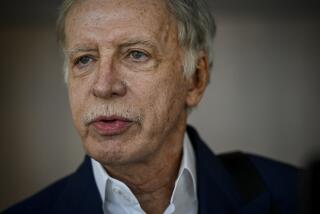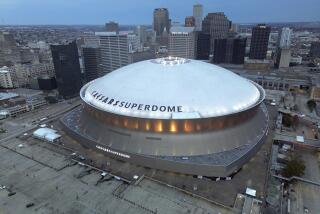Super Bowl in Los Angeles is delayed a year; Inglewood will host in 2022
Call it the Super Bowl Reshuffle.
Five days after the Rams announced their Inglewood stadium would be finished in 2020, a year later than the original plan, NFL owners unanimously voted to push the Los Angeles Super Bowl back a year until February 2022.
Tampa, Fla., will host the 2021 game originally promised to L.A. — providing both cities can prove by Aug. 25 they can live up to all the terms and commitments of their bids.
“We wanted to make sure we do everything right, 100%,” Rams owner Stan Kroenke said. “It’s a big deal for L.A. We have a Super Bowl, and that’s the important part.”
It will be the fifth Super Bowl hosted by Tampa, which last did so in 2009 when Pittsburgh defeated Arizona.
There has not been a Super Bowl held in the L.A. area since Dallas defeated Buffalo at the Rose Bowl in January 1993.
The upcoming Super Bowls will be played, in order, in Minneapolis, Atlanta, South Florida, Tampa, and Los Angeles.
L.A. would have needed a waiver from the league to host the 2021 game, because NFL rules prohibit playing a Super Bowl at a stadium in the venue’s inaugural year. However, the notion of a waiver was not seriously discussed Tuesday. The Tampa plan was not a spur-of-the-moment decision. That city was a finalist when the league awarded the game to L.A. a year ago.
The decision Tuesday solved two problems. It gave L.A. some breathing room, and it rewarded Tampa, which had fallen short in multiple Super Bowl bids in recent years.
“Bottom line is, Stan was incredibly cooperative on this,” NFL Commissioner Roger Goodell said. “He wants to do what’s right for the NFL. His No. 1 objective is creating a quality stadium for the long term for the fans in Los Angeles. His commitment has not wavered on that. So what we felt was the right thing is, don’t put any risk to the Super Bowl, which is an incredibly complex event. … It would put an undue risk to the Super Bowl and to our fans.”
The palatial, $2.6-billion Inglewood stadium, which will be home to the Rams and Chargers and was originally projected to open in 2019, will be delayed almost a year and is now scheduled to be ready for the start of the 2020 NFL season. Developers, who broke ground on the project in November, blamed the postponement on record rainfall during the “mass excavation phase” of construction.
The foul weather brought work on the project to a standstill for two months earlier this year. At times, the site looked like a lake, with water standing 12 to 15 feet deep. After the downpours, the excavated area had to be drained before work could resume.
“Our focus from the announcement last week was working with the NFL, the Super Bowl Committee and our sponsors in L.A., to make sure we could still deliver an unparalleled Super Bowl experience,” said Kevin Demoff, the Rams’ chief operating officer. “This is Los Angeles’ first chance to host a Super Bowl since the early ’90s, and it has to be a game befitting the entertainment capital of the world and showcase the best that Los Angeles can be.
“If that means it’s a year later, then we are certainly willing to push back and make sure that we make the city proud. This has always been about hosting multiple Super Bowls, and making Los Angeles a permanent spot in the Super Bowl rotation. Not about getting the earliest one we can get.”
Tuesday’s vote was conducted behind closed doors at the J.W. Marriott hotel, where owners gathered for their annual one-day May meetings. In another significant step, they also ratified the Raiders’ lease with Las Vegas, allowing that franchise to move ahead with its stadium financing plan.
The centerpiece of the Raiders’ $1.9-billion project is a 65,000-seat domed stadium with a natural grass field. The Las Vegas stadium, like the one in Inglewood, is scheduled to open in 2020.
“It’s like a first down in this long process, and now we have four more downs to go,” Raiders owner Mark Davis said. “We still have a lot of work to do, but it was a big step today in hopefully getting the shovels in the ground by the first of the year.”
The owners also approved a couple of rules changes. The overtime period was shortened from 15 to 10 minutes, and the league eliminated the 75-man roster cut-down, meaning the teams will now go from 90 to 53 players in one fell swoop at training camp.
The other notable development of the day was not a rules change but a point of emphasis, and therefore didn’t require a vote of owners. The NFL has loosened its rules on in-game celebrations. Players will now be able to use the football as a prop, for instance, or make snow angels on the ground, or stage a group celebration.
“It has never been the goal to make this the ‘No Fun League,’” said Atlanta Falcons President Rich McKay, chairman of the NFL’s competition committee. “I think what we may have done wrong in the past is tried to paint too broad of a line. Because this is an area where it’s really hard to paint a bright line.”
Former player Troy Vincent, an NFL executive vice president, said nearly 100 players were consulted to get their views on what should constitute a legal celebration.
“They were very direct: ‘Don’t point towards our bench area. Don’t stand over the top of me. Don’t flex in front of my face.’ We don’t mind you enjoying the play, but guys were very pointed about what they wanted.”
Follow Sam Farmer on Twitter @LATimesfarmer
ALSO
Snow angels are back: NFL loosens its celebration restrictions
Lawmakers have put a lot of energy into getting new stadiums built — without much success
How much could the Rams and Chargers make in their new stadium? We ran the numbers
More to Read
Go beyond the scoreboard
Get the latest on L.A.'s teams in the daily Sports Report newsletter.
You may occasionally receive promotional content from the Los Angeles Times.











